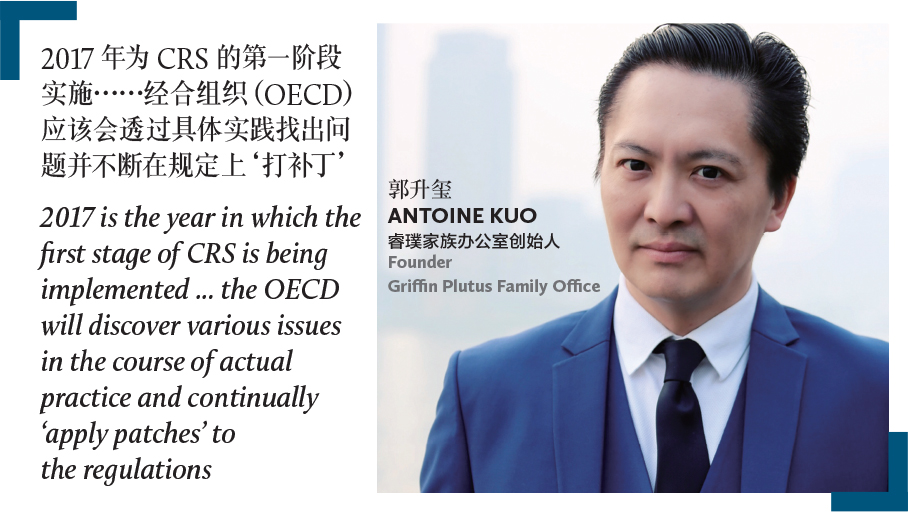The implementation of CRS in China has many worried. Antoine Kuo,
the founder of a wealth management company, analyzes what the system means for entities with Chinese tax nationality
With a view to promoting the international exchange of tax information, the Organization for Economic Co-operation and Development (OECD) created the Common Reporting Standard (CRS). This mechanism, for China – which is in the second batch of countries implementing CRS – entered into effect on 1 January 2017. Based on the implementation schedule for CRS, the central government should have a complete grasp of information on Chinese tax residents’ financial accounts in more than 100 countries and regions after the third quarter of 2018.
Of those entrepreneurs aware of this news, some feel that it is not so serious, but some have started to sleep much less comfortably at night, worried that the shell companies or personal insurance policies, accounts, etc., that they have established offshore will be discovered by the Chinese tax authorities. And some have already begun crafting plans to avoid this tax net.
Regardless of the attitude, the first thing that they must be aware of is that, while paying attention to CRS, it is also necessary to inclusively incorporate cross-border tax-related regulations within the scope of consideration, such as the Foreign Account Tax Compliance Act (FATCA), Tax Information Exchange Agreements (TIEA), base erosion and profit shifting (BEPS), the Financial Action Task Force (FATF – on money laundering), etc.
Of course, no legal provision will be free of flaws at the beginning. 2017 is the year in which the first stage of CRS is being implemented, and everyone, including the various national regulators and financial institutions, is a novice. Based on past experience, the OECD will discover various issues in the course of actual practice and continually “apply patches” to the regulations.
These dynamic adjustments are something that will have to be faced for an extended period of time from here on in. This article proposes to analyze – from the perspective of an enterprise, an individual and the operation of CRS – various aspects of CRS that require particular attention.
You must be a
subscribersubscribersubscribersubscriber
to read this content, please
subscribesubscribesubscribesubscribe
today.
For group subscribers, please click here to access.
Interested in group subscription? Please contact us.
你需要登录去解锁本文内容。欢迎注册账号。如果想阅读月刊所有文章,欢迎成为我们的订阅会员成为我们的订阅会员。
Antoine Kuo is the founder of Griffin Plutus Family Office






















